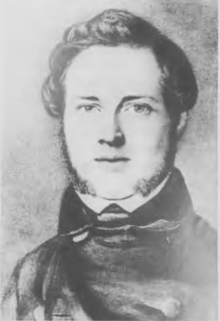Hillart Cropp
Hillert Meinen Lüders Cropp , also: Hillerd Meinen Lüder Cropp (born March 10, 1808 in Fedderwarden , † January 15, 1861 in Oldenburg ) was a German lawyer and politician . He was a member of the Frankfurt National Assembly for the Kniphausen rule .
Origin and professional career
Cropp was the son of the doctor Georg Heinrich Cropp (1777-1839) and grew up with an uncle in Jever , where he attended high school. From 1827 he studied law at the University of Göttingen and later at the University of Jena . From 1832 Cropp was then a lawyer in Kniphausen , Sengwarden and Jever. In 1839 the second main legal examination followed in Oldenburg, which he passed with distinction. In 1840 he moved to Oldenburg, where he worked as a senior court attorney from 1841 to 1860.
Political career
From 1841 to 1845, Cropp belonged to the Literarisch-Geselligen Verein in Oldenburg , which was the nucleus of the slowly emerging liberal opposition in Vormärz . However, he did not show any pronounced political interests in these years and was only known as the author of a Low German Carnival Swank, which was successfully performed in 1843 and had several editions in print.
After the outbreak of the revolution of 1848 , Cropp took an active part in the popular movement. He was a member of the Twelve Commission set up by a people's assembly on March 17, 1848 , which organized the election of an Oldenburg representative for the Frankfurt preliminary parliament. The choice fell on Maximilian Heinrich Rüder , who, as an influential member of the Literarisch-Geselligen Verein, had also given the initiative for the popular assembly. Cropp was appointed his deputy. Both traveled to Frankfurt at the end of March , where the deliberations on the formation of the preliminary parliament had started. In April 1848 Cropp ran for election to the National Assembly , but was unsuccessful. Only when the tiny lordship of Kniphausen was surprisingly granted its own representative in May 1848, he was able to secure this mandate. In the National Assembly, to which he belonged until May 30, 1849, he joined the groups of the left center, from which the Württemberger Hof fraction emerged . After his return to Oldenburg, Cropp became a member of the city council in Oldenburg and a member of the general state parliament of the Grand Duchy of Oldenburg in 1850 . He later retired from politics and focused on his legal practice.
family
His first marriage was to Elisabeth Thöle (1815–1843), daughter of the innkeeper Hinrich Thöle from Oldenburg. The two sons Georg and Johann (twins) emerged from the marriage. Georg later became a forest master in Oldenburg. In his second marriage he was married to Caroline Philippine Josephine Meyer (1824–1904) daughter of AG Meyer, master carpenter in Oldenburg. With her he again had two sons, Anton and Heinrich.
literature
- Hillerd Meinen Lüder Cropp. In: Hans Friedl u. a. (Ed.): Biographical manual for the history of the state of Oldenburg . Edited on behalf of the Oldenburg landscape. Isensee, Oldenburg 1992, ISBN 3-89442-135-5 , pp. 138-139 ( online ).
| personal data | |
|---|---|
| SURNAME | Cropp, Hillart |
| ALTERNATIVE NAMES | Cropp, Hillerd My Lüder |
| BRIEF DESCRIPTION | German lawyer, member of the Frankfurt National Assembly |
| DATE OF BIRTH | March 10, 1808 |
| PLACE OF BIRTH | Fedderwarden |
| DATE OF DEATH | January 15, 1861 |
| Place of death | Oldenburg |
